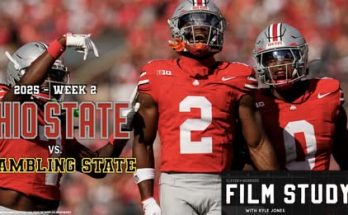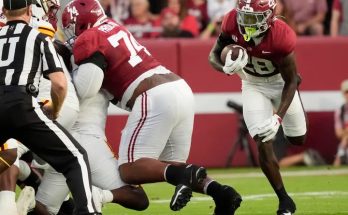Urban Meyer, the former college football coaching luminary, delivered a candid and unflinching critique of Texas Longhorns quarterback Arch Manning following the team’s dominant 38-7 victory over San Jose State on September 6, 2025. The comments came during Meyer’s On3 podcast, where he analyzed Manning’s performance in detail, highlighting areas that he believes require urgent improvement despite the statistical success Manning put on display. The young quarterback’s final line of 19-of-30 passing for 295 yards, four touchdowns, and a 20-yard rushing score might look impressive at first glance, but Meyer was quick to point out that raw numbers do not tell the full story. “His accuracy, quite frankly, was not good,” Meyer remarked, a statement that immediately sent shockwaves through the Texas fan base and college football circles alike.
Meyer, known for his meticulous eye for quarterback mechanics and decision-making, dissected Manning’s performance with pointed examples. He specifically mentioned two “boneheaded” mistakes that underscored his concern. The first was a red-zone interception, a play that should have been routine for a quarterback of Manning’s pedigree and talent. Meyer noted that this mistake stemmed from inconsistent footwork and an impatience in reading the defense, suggesting that Manning was forcing throws rather than letting plays develop. The second error was a near-lost fumble, another situation that Meyer attributed to rushed decisions and a lapse in focus. In his view, these moments were not anomalies but symptomatic of a quarterback still in the process of refining his craft, particularly under the heightened pressure and speed of SEC-level competition.
Despite these criticisms, Meyer made it clear that his assessment was not a dismissal of Manning’s potential. He praised the young quarterback’s arm strength and athleticism, acknowledging that Manning has the raw tools to excel at the highest levels of college football. The key, according to Meyer, lies in translating those tools into consistent, fundamentally sound execution. “He’s got all the physical gifts you could ask for, but talent alone doesn’t win in the SEC. Mechanics, footwork, and decision-making—those are the things that separate good quarterbacks from great ones,” Meyer emphasized. This nuanced perspective resonated with many observers who recognize that while Manning’s talent is undeniable, the jump from a highly touted high school recruit to a reliable SEC starter is rarely seamless.
Arch Manning himself addressed the critique in his postgame comments, demonstrating a level of maturity that many analysts had hoped to see from the young quarterback. Manning admitted to being “sloppy” on certain plays, acknowledging that there were moments where his execution fell short of the standard expected at Texas. He pledged to “step up” and clean up the mistakes, signaling a willingness to learn and adapt, which is often as critical for young quarterbacks as raw talent. The transparency in his self-assessment was noted by fans and analysts alike, suggesting that Manning possesses not only the physical gifts but also the mental resilience needed to respond to constructive criticism.
The timing of Meyer’s critique is particularly significant given Texas’ position in the college football landscape. The Longhorns, currently ranked No. 7, are in the midst of a season that carries high expectations. With a 1-1 record following the San Jose State game, Texas faces UTEP on September 13, and the SEC schedule looms large. Fans and pundits alike are keenly aware that performances against non-conference opponents, while important, often do not fully reveal a team’s vulnerabilities. Meyer’s comments serve as a reminder that while the scoreboard may reflect dominance, the underlying performance metrics and execution details often tell a different story.
Reaction to Meyer’s assessment has been divided on social media platforms, particularly on X, where fans and analysts debated the validity and fairness of his critique. Some defended Manning, pointing to his big plays and the overall result of the game, arguing that victories and statistical production are the ultimate indicators of a quarterback’s effectiveness. Others echoed Meyer’s concerns, emphasizing that red-zone turnovers and near-fumbles are red flags, particularly when considering the caliber of opponents Texas will face later in the season. The debate highlights a broader discussion in college football circles about the balance between evaluating raw talent versus execution and decision-making under pressure.
Meyer’s critique also touches on a broader trend in quarterback development, particularly for those entering highly competitive conferences like the SEC. Young quarterbacks often experience growing pains as they adjust to faster defenses, complex schemes, and higher stakes. Even highly touted recruits, such as Manning, are not immune to these challenges. The ability to maintain composure, make precise throws under pressure, and minimize mistakes becomes increasingly critical when facing elite defenses. Meyer’s emphasis on footwork and mechanics underscores this point, reminding fans and analysts that quarterback success is often rooted in consistent fundamentals rather than flashes of brilliance.
The Longhorns coaching staff, including offensive coordinator A.J. Milwee, will likely take Meyer’s observations into account as they prepare for upcoming games. Meyer’s familiarity with Milwee, having coached him at Akron, lends credibility to his analysis and suggests that the critique is informed by an understanding of the offensive system and the quarterback’s role within it. The challenge for Texas will be to ensure that Manning’s development continues in a structured and supportive environment, where his talent can be maximized while minimizing the types of errors Meyer highlighted.
For Manning, the path forward is clear. Consistency, attention to detail, and disciplined execution will be essential if he hopes to meet the lofty expectations placed upon him. The red-zone interception and near-fumble serve as teachable moments, providing concrete examples of where improvement is needed. By focusing on mechanics, footwork, and decision-making, Manning can build the type of reliability that separates good quarterbacks from elite ones. His acknowledgment of mistakes and commitment to improvement suggest that he is receptive to feedback and capable of making the necessary adjustments.
The broader implications of Meyer’s critique extend beyond a single game or even a single player. For Texas, maintaining a high level of performance in the SEC requires not just talent but execution, preparation, and mental toughness. Manning’s development is intertwined with the team’s success, and the coaching staff will need to ensure that he is equipped to handle the increasing complexity and pressure of SEC play. Games against UTEP and other upcoming opponents will serve as benchmarks, testing both Manning’s progress and the team’s ability to capitalize on his strengths while mitigating risks associated with mistakes.
Meyer’s commentary also adds an interesting dimension to the ongoing conversation about quarterback evaluation in the modern era. With extensive media coverage, real-time statistical analysis, and social media debate, young quarterbacks face scrutiny from multiple angles. While fan enthusiasm often focuses on highlight-reel plays and statistical milestones, coaches and analysts like Meyer emphasize the importance of subtleties—mechanics, foot placement, and decision-making—that may not always be visible in traditional box scores. This tension between surface-level success and underlying execution reflects a broader shift in how quarterback performance is assessed in college football today.
As fans continue to dissect Manning’s performance and Meyer’s critique, one thing remains clear: the young quarterback’s journey is far from complete. The San Jose State game, while a statistical triumph, revealed areas that demand attention and growth. Meyer’s analysis serves as both a warning and a guidepost, emphasizing that success in college football, particularly in a competitive conference like the SEC, is rarely guaranteed by talent alone. It requires discipline, preparation, and the ability to learn from mistakes—a challenge that Manning appears willing to embrace.
Looking ahead, the Texas coaching staff faces a crucial task in balancing Manning’s development with team performance. Ensuring that he refines his footwork, maintains composure under pressure, and improves accuracy will be essential for sustained success. The team’s upcoming schedule, including the matchup against UTEP, will provide an opportunity to gauge Manning’s progress and address any lingering concerns before facing higher-tier SEC opponents. Fans and analysts alike will be watching closely, eager to see whether Manning can translate his raw ability into consistent execution that aligns with the program’s high expectations.
Urban Meyer’s candid evaluation of Arch Manning underscores a key principle in football: talent can win games, but precision and consistency win championships. The Longhorns’ dominant victory over San Jose State may mask some of the underlying issues in Manning’s performance, but the scrutiny he now faces is a crucial step in his growth as a quarterback. By addressing the mistakes highlighted by Meyer, Manning has the potential to elevate his game, solidify his role as a team leader, and meet the lofty expectations of a Texas program accustomed to competing at the highest level.
In conclusion, while Arch Manning’s performance against San Jose State featured impressive statistics and a commanding win, Urban Meyer’s critique serves as a timely reminder that success in college football extends beyond the scoreboard. Accuracy, footwork, and decision-making are critical components of quarterback play, and even the most talented players must continually refine these skills to thrive in the SEC. Manning’s acknowledgment of his mistakes and commitment to improvement suggest that he is ready to embrace this challenge, but only time and upcoming matchups will reveal whether he can consistently translate his talent into execution. As Texas prepares for UTEP and the rest of the season, the scrutiny will continue, and the Longhorns’ fans will watch closely, hopeful that Manning can rise to the occasion and lead his team to sustained success in one of college football’s most competitive environments.
Meyer’s commentary, while critical, may ultimately prove invaluable in shaping Manning’s development. By spotlighting specific errors and offering insight into the technical aspects of quarterback play, Meyer provides both the player and the team with a blueprint for improvement. For fans, analysts, and coaches, this critique offers a deeper understanding of the complexities involved in quarterback performance and highlights why even seemingly flawless victories warrant careful examination. As Arch Manning continues his journey at Texas, the lessons from the San Jose State game—and from Meyer’s candid assessment—may well define the trajectory of his college career, setting the stage for both challenges and triumphs in the seasons ahead.
The debate sparked on X and other platforms underscores the passionate engagement of college football fans, who weigh statistical performance against execution and potential. Some will continue to celebrate Manning’s big plays and the team’s lopsided win, while others will focus on the cautionary tale highlighted by Meyer’s critique. This duality reflects the evolving nature of player evaluation in modern football, where both results and process are scrutinized in real-time. Ultimately, the combination of talent, learning from mistakes, and responding to expert feedback will determine Manning’s ability to fulfill the high expectations placed upon him at Texas.
As the Longhorns move forward, the upcoming games will not only test the team’s resilience but also Manning’s capacity to internalize criticism, refine his skills, and maintain consistency. The challenge of balancing performance under pressure with the need for technical precision is a hallmark of quarterback development, particularly for a player navigating the transition from prodigious talent to reliable starter in one of the nation’s most competitive conferences. Urban Meyer’s critique, though pointed, may serve as a catalyst for growth, providing Manning with concrete areas to address and a framework for improvement that extends beyond the confines of a single game.
The scrutiny of Arch Manning’s performance, fueled by Meyer’s comments, serves as a reminder of the complexities of quarterback evaluation and development. Success at Texas, and in the SEC at large, requires more than impressive statistics; it demands consistent execution, mental acuity, and the ability to learn from mistakes. Manning’s willingness to acknowledge shortcomings and commit to improvement bodes well for his development, but only consistent application of these lessons will determine his trajectory. Fans, analysts, and coaches alike will continue to monitor his progress closely, understanding that the difference between potential and achievement often hinges on the mastery of fundamentals under pressure.
In reflecting on the San Jose State matchup and Meyer’s subsequent critique, it is clear that Arch Manning is at a pivotal juncture in his young career. The performance displayed flashes of brilliance but also exposed areas requiring refinement, particularly in accuracy and decision-making under pressure. Meyer’s observations serve as both a warning and a guide, highlighting the critical importance of mechanics, footwork, and composure in achieving long-term success. For Manning, embracing this feedback and translating it into tangible improvement will be essential as he leads Texas through the remainder of the season and navigates the challenges of SEC competition.
Ultimately, the dialogue surrounding Manning’s performance illustrates the delicate balance between talent and execution in college football. While his arm strength, athleticism, and ability to make big plays are undeniable, the need for consistent accuracy and sound decision-making remains paramount. Urban Meyer’s pointed critique, combined with Manning’s acknowledgment of his own mistakes, sets the stage for a developmental journey that will be closely watched by fans, analysts, and opponents alike. As the Longhorns prepare for UTEP and beyond, the evolution of Arch Manning’s game will be a central storyline, reflecting the ongoing challenge of translating immense talent into sustained, championship-level performance.
Manning’s path forward will require diligence, focus, and a commitment to mastering the technical and mental aspects of quarterback play. The mistakes highlighted by Meyer are not merely setbacks; they are opportunities for growth and refinement, providing a roadmap for improvement. As Texas continues its season, the lessons learned from the San Jose State game and Meyer’s candid assessment may prove invaluable, offering a framework for developing the type of precision, consistency, and leadership required to succeed in the SEC and beyond. The journey ahead promises to test Manning’s resilience, adaptability, and capacity for growth, setting the stage for a defining chapter in his college football career.
For fans, the conversation sparked by Meyer’s critique underscores the multifaceted nature of quarterback evaluation. Statistics, while impressive, tell only part of the story. Execution, decision-making, and composure under pressure are equally, if not more, critical in determining a quarterback’s impact on the field. Arch Manning’s performance against San Jose State, coupled with Meyer’s observations, provides a case study in the complexities of player development at the highest level of college football. It is a reminder that even in the midst of decisive victories, there is always room for growth, refinement, and the pursuit of excellence.
Urban Meyer’s candid commentary on Arch Manning’s performance ultimately reinforces the importance of continuous improvement in football. For Manning, the challenge is to take the constructive criticism to heart, hone his skills, and demonstrate the ability to perform consistently against increasingly formidable opponents. The San Jose State game, while a clear victory, serves as both a showcase of talent and a cautionary tale about the nuances of quarterback play. As Texas moves forward, the trajectory of Arch Manning’s development will be closely scrutinized, with Meyer’s critique serving as both a benchmark and a catalyst for the young quarterback’s ongoing growth and evolution in the SEC.
The conversation surrounding Manning’s performance and Meyer’s critique is likely to continue throughout the season, particularly as Texas faces more challenging opponents. Fans, analysts, and commentators will dissect each game, weighing statistical production against execution, decision-making, and overall poise. This ongoing dialogue highlights the dynamic nature of college football evaluation, where talent, performance, and learning from mistakes intersect to shape the narrative around a player’s career. For Arch Manning, the ability to internalize feedback, correct flaws, and maintain consistency will ultimately define his impact and legacy at Texas.
In summation, Arch Manning’s performance against San Jose State was a microcosm of both his immense potential and areas requiring refinement. Urban Meyer’s pointed critique underscores the critical importance of accuracy, footwork, and decision-making in quarterback play, even in the context of a dominant victory. Manning’s acknowledgment of mistakes and commitment to improvement suggest that he is prepared to embrace these challenges, but the true measure of his growth will be evident in the consistency and precision he demonstrates in the games ahead. As Texas continues its season, the development of its star quarterback will remain a focal point, illustrating the intricate balance between talent, execution, and the pursuit of excellence that defines college football at the highest level.
Fans and analysts alike will be watching closely to see how Arch Manning responds to Meyer’s critique and whether he can translate raw ability into sustained performance against increasingly competitive opponents. The Longhorns’ upcoming matchups will serve as both a test and an opportunity for Manning to refine his game, minimize mistakes, and demonstrate that he can meet the lofty expectations associated with his talent and pedigree. The dialogue sparked by Meyer’s comments provides a deeper understanding of the nuances involved in quarterback development, highlighting that even in the wake of decisive victories, there is always room for improvement, growth, and the pursuit of mastery.
Ultimately, Urban Meyer’s candid assessment serves as a valuable lens through which to evaluate Arch Manning’s performance and potential. It underscores that while talent can create opportunity, precision, discipline, and consistency are the hallmarks of sustained success. As Texas navigates the remainder of the season, Manning’s ability to internalize criticism, refine his mechanics, and execute under pressure will be crucial in determining not only his individual trajectory but also the Longhorns’ overall success in one of college football’s most challenging conferences. The San Jose State game and Meyer’s subsequent critique may very well represent a pivotal moment in Manning’s journey, offering lessons that could shape the course of his collegiate career and set the stage for both challenges and triumphs yet to come.
Fans, analysts, and teammates alike will undoubtedly continue to debate and monitor Manning’s progress in the wake of Meyer’s critique. The blend of raw talent and technical refinement required to succeed at Texas and in the SEC is demanding, and the young quarterback’s response to these challenges will define his development trajectory. Meyer’s insights provide both a cautionary note and a roadmap, emphasizing that even dominant victories must be dissected to ensure long-term growth and consistency. For Arch Manning, the opportunity to rise to this challenge is as significant as any individual game, potentially shaping his legacy and the Longhorns’ fortunes for years to come.
As the season progresses, Texas will lean on its coaching staff and quarterback to convert talent into sustained success. Arch Manning’s journey, framed by the lens of Meyer’s critique, offers a compelling narrative about the demands of elite college football, the value of constructive feedback, and the importance of continuous improvement. While the San Jose State game provided a statistical showcase, the true test lies ahead, in how Manning refines his game, addresses weaknesses, and establishes himself as a consistent and reliable leader for the Longhorns. The lessons from Meyer’s assessment, if applied effectively, could well define the trajectory of his collegiate career and serve as a blueprint for achieving long-term success.
In reflecting on Urban Meyer’s candid critique and Arch Manning’s performance, it becomes clear that the path to quarterback excellence is multifaceted. Raw talent, while essential, must be complemented by precise mechanics, disciplined decision-making, and the ability to perform under pressure. Manning’s willingness to acknowledge mistakes and commit to improvement indicates a promising mindset, yet the ultimate measure of growth will be seen in how consistently he can translate talent into execution. For Texas, and for fans following Manning’s journey, the challenge lies in supporting his development while holding him accountable to the standards required to compete at the highest level of college football.
The scrutiny surrounding Manning’s play highlights a fundamental truth in college football: dominant performances do not guarantee perfection. Urban Meyer’s assessment serves as a reminder that even the most talented quarterbacks must continually refine their craft, learn from mistakes, and maintain consistency under pressure. Manning’s response to this critique, both in practice and in future games, will be crucial in shaping his trajectory and solidifying his role as a leader for Texas. As the Longhorns prepare for upcoming matchups, the lessons from San Jose State and Meyer’s observations will likely guide both coaching decisions and Manning’s personal development, emphasizing that sustained success requires more than talent alone—it requires precision, discipline, and mental fortitude.
Meyer’s commentary also underscores the broader implications for quarterback evaluation and development in



